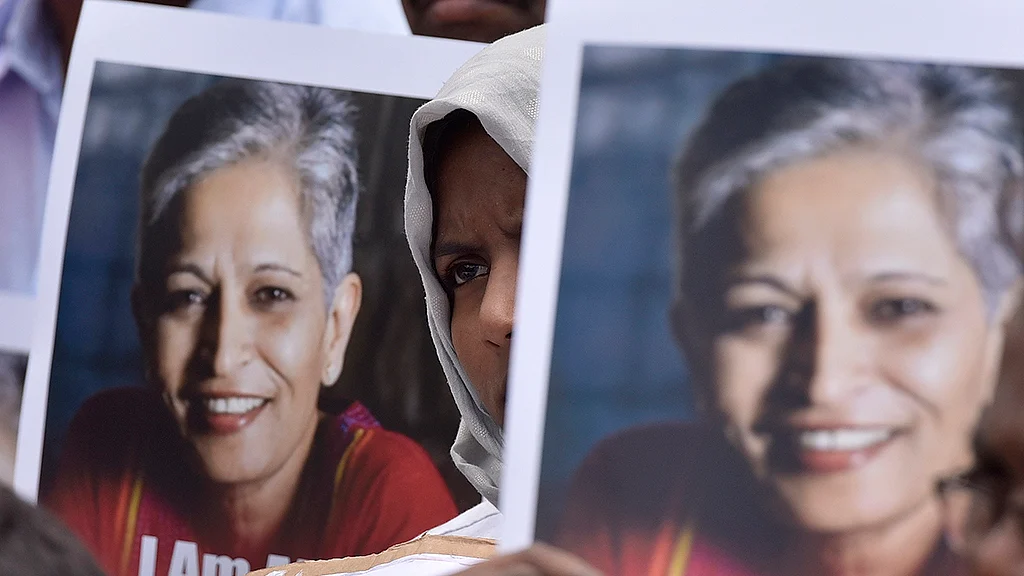The pattern in killings: target states with freedom of speech
Since the saffron forces do not have recourse to the administrative and police machinery in states not ruled by the BJP, they have to kill to silence opposing voices

The September 5 killing of Gauri Lankesh in the Congress-ruled Karnataka has once again exposed the design of right-wing forces to silence the voice of dissent in the states not ruled by t hem. Since in the BJP-ruled states there is little scope for such resistance––as they have virtually been muzzled––the zealots are now on their mission in states where some freedom of speech exists.
While two of them, Gauri and M M Kalburgi, were killed in the Congress-ruled Karnataka in the last two years, Govind Pansare and Narendra Dabholkar were shot dead in Kolhapur (Feb 2014) and Pune (August 2013) respectively when the Congress-NCP government was in power in Maharashtra. Both were killed by two-wheeler borne criminals while they were taking morning walk.
The killing in the Congress-ruled states gave enough ammunition to the critics to target the ruling government; yet what can not be ignored is that all the four victims were opposed to a particular ideology. Thus they were not the ordinary case of the failure of law and order where a reporter is killed by professional criminals as they often
happen elsewhere.
All the four were killed because there still was some scope for them to write, protest and express their freedom as the state machinery was not openly against them.
In contrast there is little scope for such activities in Gujarat, Madhya Pradesh, Chhattisgarh or even Rajasthan and Maharashtra, where the BJP has come to power more recently.
The way the Chhattisgarh government treated renowned academics and activists like Bela Bhatia and Nandini Sundar––not to speak of other journalists in towns and villages––is now well-known. They were the victims of smear campaign carried by the police and civil administration, not to speak of the vigilant groups.
In neighbouring Madhya Pradesh the way the government machinery is used to crush people’s voice is no more a secret. The manner in which fasting Medha Patkar, along with her associates, were lifted and thrown into jail could not be known immediately as most newspapers and TV channels can not dare to give due coverage. This is the state where more than 40 people, including a Dean of Jabalpur Medical College, Dr Arun Sharma, and senior journalist of Aaj Tak Akshay Singh, had lost their lives in mysterious circumstances since Madhya Pradesh Professional Examination Board Scam (also known as Vyapam Scam) was unearthed in 2013.
If the accused, witnesses and a journalist investigating a scam can be eliminated in such a large number what would happen to those who dare to challenge the prevailing ideology of the state?
Regarding Gujarat the less said is better. While there are some brave souls still fighting, in spite of the fact that cases, including that of sedition, have been slapped against them, the state has largely succeeded in suppressing all the opponents.
Thus, in the states where administrative machinery is already there to curb the forces defying the Hindutva ideology there is no need for gunmen to act as they did in Karnataka and Maharashtra. This is not to suggest that the states ruled by Congress and other regional parties do not try to impose restrictions on opposition. They do but the degree of repression is much different.
Follow us on: Facebook, Twitter, Google News, Instagram
Join our official telegram channel (@nationalherald) and stay updated with the latest headlines
- Vyapam scam
- Nandini Sundar
- Gujarat
- Madhya Pradesh
- Gauri Lankesh
- Karnataka
- Hindutva
- MM Kalburgi
- Bela Bhatia
- Govind Pansare
- Narendra Dabholkar
- Medha Patkar
- Chhattisgarh,
- Arun Sharma
- Akshay Singh